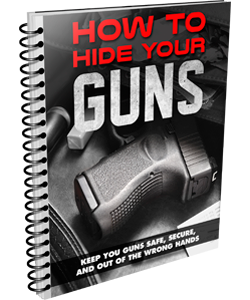Knowing about a diversity of unusual weapons and understanding what kinds of objects might work as a tool of self-defense is vital. Read on to learn more.
Unusual Weapons and How to Use Them
The Weapons
Weapons are my business – you name it and I’ve seen it, or used it, or seen it used. Much of my life has been spent familiarizing myself with such tools of destruction: bombs, guns, knives, projectiles and blades of all kinds, bashers, bangers, swatters, whips, clubs, and flames. If it serves to destroy, I probably know about it. It’s an evil specialty, but a decisive one that has saved my dastardly ass on multiple occasions. As such, I shouldn’t have been surprised when I was approached and asked to write this article on unusual weapons. I should have seen it coming. At first, I refused – what if this deadly, dark information got into the wrong hands? What if this guide served to enable evil and enact terror?
Well, it still may. I’ve come to terms with that. The way I see it: if I didn’t write it, someone else would, and better the resident expert of deadly devices write an article on strange and obscure weapons than some chump who doesn’t know half about the subject. Right?
So I accepted, begrudgingly, and here I am: writing a guide for anonymous masses of the Internet, about odd, unusual weapons and how to use them. Perhaps I have too much faith in you people. Regardless, at this point, all I can do is implore you to use this knowledge for good instead of evil. Refrain from engaging in any tonfa whooping sprees, or katar massacres as best as you can. Such aggressive endeavors are severely frowned upon, and I don’t want any part in them.
With that in mind, let’s dive in.
Nunchucks

These are the classic martial arts movie weapons, made famous by fighters like Bruce Lee, who was a true master of nunchucks. The weapon itself is relatively simple: two wooden handles connected by a string or chain. By whipping the nunchucks in half and full circle swings you can turn yourself into an unapproachable wielder of pain. And they are painful. Being struck with a real pair of hardwood nunchucks is enough to drop a full-grown man on his ass. They come in a variety of sizes and shapes, colors and styles, but generally the simpler the design, the better.
Nunchucks are supposed to be gripped high up, close to the chain/string that links the two handles together. The first basic strike taught to most students is to hold one handle in your hand, and the other in your armpit, flick the nunchuck out of your armpit with a quick jerk of the wrist. The handle held beneath your arm should flip out and downwards in an arc that will whip the nunchuck back up and into your armpit – essentially reloading with every strike. I wouldn’t recommend getting too much fancier than that, lest the inexperienced nun chucker injure themselves. Here is a good video that covers more technical ways to use nunchucks.
Tonfa
You might recognize the shape of this club-like weapon because the modern police baton looks very similar. Police adopted the handle club because of its versatility and utility – it can be used as a restraint, a club, a prod, extended reach, a strong block or amplified striker.
There are a few basic strikes with tonfa, the first of which is to hold the handle loosely and swing the tonfa downwards in a big semi-circle so that the long end whips downwards like a club, striking your target and returning to your arm. Another is to simply hold the grip and straight punch. The extra inch or two of wood makes any strike hurt a lot more. Here is a guide to some more basic tonfa strikes. Tonfa is usually used in pairs (one in each hand) but if you prefer to keep one hand free, using one work just as effectively. They also are wonderful for reinforcing blocks, if you are defending yourself.
Bullwhip

They aren’t the most common weapon you’ll find laying around, but Indiana Jones sure made his work wonders, so maybe there’s something to it. Use extreme caution though: whips strike with more than enough power to flay flesh wide open, so try a couple practice strikes before going full throttle 100%.
The crack made by a whip is actually a small explosion caused by the sound barrier breaking – like when jets exceed the speed of sound and cause blasts big enough to break windows. The basic concept behind using a bullwhip is to change the direction of the tip fast enough to break the speed of sound and create that small break in the sound barrier.
So most of the strikes involve swinging the whip in one direction and then very quickly snapping that movement in reverse to change the direction of the whip tip. It takes some practice to get good at this, but once you have the concept down, you can successfully apply that to many different whip striking techniques. This guy (Adam Winrich) is the Internet’s bullwhip-master, and in his videos, he demonstrates several different ways to use one.
Sling
Slings are one of the oldest weapons in human history, and in their simplicity is a great functionality. As the name implies, slings were designed to sling blunt projectiles with tremendous force. They basically consist of two lengths of rope or cord with a pouch tied between the two (the same thing can be accomplished with one length of cord and a pouch tied along it).
Load the projectile into the pouch so it sits snugly, and grip both ends of the sling in one hand. Twirl the sling with increasing speed above your head and when you are ready, release one end of the sling (while maintaining your grip on the other end) and the projectile will be released. It will likely take some practice to find the correct release timing for proper aim, but once you get the hang of this simple weapon it can be very deadly.
Macuahuitl
This bladed paddle was popular amongst the civilizations of the Americas (ie Mayans, Inca, Aztecs). It is essentially a long wooden paddle fixed with short obsidian blades at intervals along the edges of the paddle. The weapon was used much like a sword or an axe, and swung at enemies with the intention of ripping through flesh. Obsidian, for those who don’t know, is one of the sharpest substances on earth – so sharp, in fact, it slices through different materials on a molecular level – that’s why they are popular in the medical field.
Boomerang

Most of us have heard of boomerangs and even tested them. This ancient form of projectile technology was developed by the aboriginals of Australia as a means for hunting. While boomerangs are famous for their ability to “come back” to the thrower – typically when aboriginals hunted for animals with boomerangs, they would aim their shots so the boomerang flew outwards and upwards, and would come back to strike down upon the unsuspecting animal.
You can also just chuck them straight at your target and do some damage if you aren’t feeling really fancy. Boomerangs are surprisingly effective weapons for self-defense too – if thrown at an assailant they can strike with enough force to break the skin, and if used as a club they can be deadly.
Emeici
The Chinese are famous for strange weapons. Kung fu is full of oddly shaped, strangely designed weapons that look like great ways to hurt yourself. Emeici are one of those. Basically, these pointed rods are attached to your hands via rings. The rods can then be spun and manipulated in wildly complex patterns and techniques. Here is a video of someone using them. I’m not even going to try and explain how to use these – just jab your attacker and try not to harm yourself.
Katar
This is a very old form of push dagger, characterized by its H-shaped handle. These were unique to South Asia (India especially) and were used for both combat and ceremonial worship. Just from looking at this age-old fighting knife, one can kind of tell how it is meant to be used. It’s pretty simple actually: hold the handle, stab your enemy. The bonus to using one of these is they are easily concealable.
Man Catcher
I don’t ever want to run into someone wielding one of these awful, nightmarish weapons. If you’ve seen dog catchers use those long rods with a loop on the end, to snare dogs by the neck and keep them away at a safe distance, then you understand the concept behind the “man-catcher.” Except instead of a harmless loop at the end, this weapon has a ring of hooks, meant to tear and cut and stab into the neck of whoever might be unfortunate to get “caught.” Just imagining being stuck in one of these is enough to send shivers down my spine – but if you’re on the delivering end of a man-catcher, you will probably be just fine.
Chakram
Imagine a frisbee that is ringed with a razor sharp edge. That is the idea behind a chakram. It was the weapon used by Xena the Warrior Princess, and Odd Job from James Bond (sort of – in hat form). Usually, these are circular disks that can be hurled across great distances to cleave into a target a long ways off. Just throw it like a Frisbee, stand back, and watch the carnage ensue.
A Note on Creative Weapon Uses
Here’s the thing when it comes to using weapons in an emergency situation, you might not always get to fight with your favorite weapon. Likely, you will be forced into combat unexpectedly and you’ll have to use whatever resources are laying around at your disposal. That might mean using a strange and unknown weapon you’ve never seen before. That might also mean improvising and using something weapon-like as a weapon.
And that is the real point of this article: knowing about a diversity of different types of weapons, and understanding what kinds of objects might work as a tool of self-defense. This is an extremely important skill – something any survivor should be keen to hone.
So keep that in mind moving forward. It’s not that you need to master every weapon ever devised, but understanding the concepts behind different weapons might enable you to think outside of the box when threatened – and that can make the difference between life and death.
Watch this video by Top 10 Trends and discover some interesting weapons used during the medieval times:
It doesn’t hurt to simply be familiar with a lot of different hand weapons. Even if you avidly practice your marksmanship or swordsmanship, if you neglect to understand how other weapons work you aren’t doing yourself any favors. The more you know the better, and the more you know about weapon use the better prepared you’ll be able to protect yourself in a dangerous situation.
Did you find this list of weapons useful? Let us know in the comments section below!

Up Next: 20 Essential Homemade Weapons For When SHTF
Editor’s Note: This post was originally published on February 24, 2017, and has been updated for quality and relevancy.





I started to try to read the article, but the band down the left side with the pinterest, facebook, etc partially covers the words. And I find it so extremely annoying to try to read around it that I just left.
You can hide that panel by placing your cursor at the bottom of it to reveal the arrows that hide it when clicked.
It would have been nice to be able to see a picture or video of each weapon.
There were 10 weapons advertised but only a way to see 6 of them. WTH?
I agree with John S.Put the pictures in the article.
I would like to see a Yawara Stick in your list and a video clip showing an expert using it.